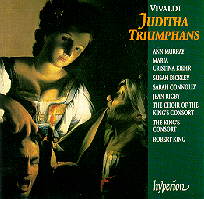Vivaldi Juditha Triumphans devicta Holofernes barbarie RV644
Hyperion and
Naïve recordings

The Kings Consort cond Robert King
Juditha Ann Murray
Vagas Maria Cristina Kiehr
Holofernes Susan Bickley
Abra Sarah Connolly
Ozias Jean Rigby
The Hyperion Vivaldi Sacred Music - Volume 4
Recorded 1997 2 CDs 148.29 minutes
Whilst issued under the banner of Vivaldi's Sacred Music, this recording must have at least equal appeal for opera enthusiasts.
It is the only survivor of Vivaldi's four oratorios, and written at just the time (1716) when he was beginning to find his feet as a composer of opera. At that time he was employed as director of orchestra and choirmaster to the Ospedale della Pieta, an establishment for orphaned girls reno wned both for its collection of musical instruments and the vocal prowess of its students.
The libretto for Juditha was prepared by Giacomo Cassetti, and a good one it is with some quite catchy Latin verse. In line with the conventions of the day, the work is scored for five solo voices, chorus and orchestra, to a story taken from the Bible, although in this case much simplified to reduce the number of characters. There is no Narrator, the action is told merely through the voices of the participants, and whilst there are no vocal ensembles, there is dialogue within the recitatives.
The plot is relatively simple. Holofernes at the head of the Assyrian army has attacked Judea . Juditha and her servant Abra visit his camp ostensibly to ask for peace. Holofernes is bowled over by her looks and dismisses his guards and whilst he relaxes in her company. When he is asleep Juditha seizes his sword, beheads him, and escapes carrying off his head as a trophy. Holofernes' servant Vagas reacts with shock and sorrow, and Ozias the priest of the Judeans leads the celebration of Juditha's triumphant return.
Vivaldi is at his most lyrical in this score, the music and plot evolves in fine operatic style and reach full dramatic mode in the final Act. It would be hard to imagine a better gathering of artists for the project. All the soloists are excellent, and although the choir of the King's Consort are not always as clear with their words as one might wish, they produce a good period sound. Under Robert King's direction, the orchestral accompaniment is also exceptional, and with Hyperion's customary attention to detail the names of the instrumental soloists and semi-chorus members are noted in the full libretto.
There is also a detailed synopsis and a scholarly introduction to the piece by Michael Talbot, neither of which are included in Hyperion's recent boxed compilation of Vivaldi's Sacred Music. (Each of the individual volumes has more comprehensive notes than the set, which could be a factor in deciding how to buy them.)
Highly recommended I just wish the scores of Vivaldi's other oratorios had survived.
Serena Fenwick
Vivaldi Juditha Triumphans devicta Holofernes barbarie RV644
Academia Montis Regalis cond Allesandro De Marchi
Juditha Magdalena Kozena
Vagaus Marina Comparato
Holofernes Maria Jose Trullu
Abra Anike Herrmann
Ozias Tiziana Carraro
Coro Giovanili dell'Accademia Nazzionale di Santa Cecilia
Naïve OP 30314 Tesori del Piemonte - Volume 10 Recorded October 2000 3 CDs 165.31 minutes
This second recording of Juditha Triumphans to have come my way recently is stylistically very different.
Given the title of Oratorio, Vivaldi compose the work for the famous female choir and musicians of the Ospedale della Pieta. Hyperion's recording (above) places it very much in the context of Sacred Music, and it is easy to imagine the same voices combined and intoning plainchant with quiet reverence. Naïve's recording recognises and exploits the intrinsic dramatic nature of the piece and places it firmly on the stage. Although the students of the Ospedale were only permitted to perform behind a curtain, their names were well known as soloists, some even achieving a measure of diva status, and they could perhaps have adopted a more florid operatic style in this work.
The substantial booklet includes commentaries by Michael Talbot on Vivaldi's sacred writing in general and the oratorio itself, together with Allessandro De Marchi's detailed analysis of the problems of interpretation and his thought process in resolving them. The full Latin text is supplied with French and German translations, and with what is described as an English translation and adaptation by Geoffrey Marshall : which I found of doubtful merit.
This performance certainly brings out the full impact of the text. Juditha's actions in beguiling the Assyrian leader, seizing his sword whilst he sleeps, and carrying his head away as a trophy are richly illustrated, as are the shocked horror of Vagaus on finding his master slain, and the triumphant reaction of high priest Ozias and the Judean people.
The musicians of Academia Montis Regalis play well for Allesandro De Marchi, who never forces the tempo and observes all the repeats. Thus the work spreads to three CDs with alternative versions of two of the arias added in for good measure. The recording is clean and close up, the singing is of high standard (though for me the Hyperion cast have the edge) and the voices are well contrasted to portray individual characters.
Serena Fenwick
|

